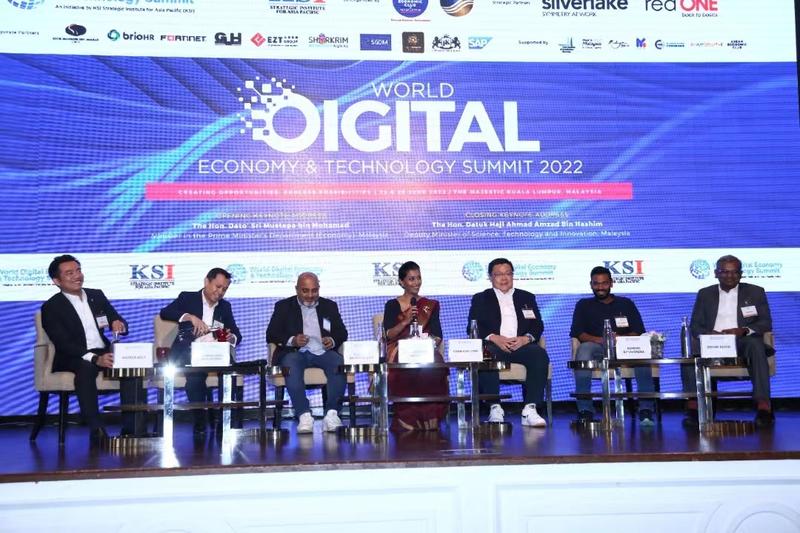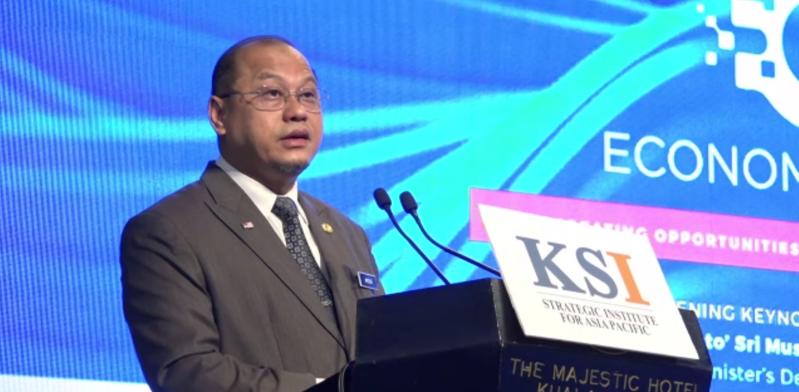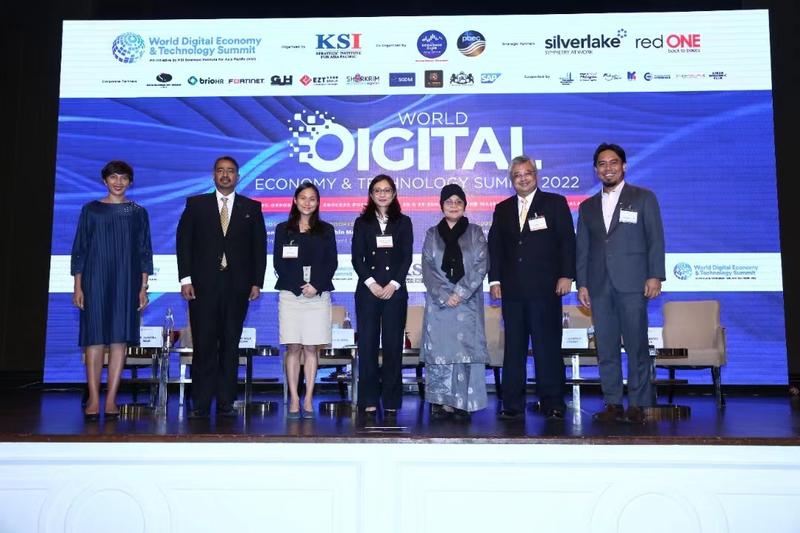 Kavitha Muthy (center), Chief Strategy Officer at Intellize Tech Services moderates a discussion on corporate survival in a digital era at the World Digital Economy and Technology Summit 2022, on June 29, 2022. Panel discussants (from left): Aadrin Azly, Chief Digital Officer at Petronas; Muhammad Afhzal Abdul Rahman, Chief Digital Technology Officer, Employees Provident Fund; Mohamed Anwer Yusoff Head, Industry and Business Development, Cybersecurity Malaysia; Chan Kok Long, Co-Founder and Chief Sales Officer, iPay88; Sumesh Rahavendra, Chief Digital & Strategy Officer, Pos Malaysia; and Jeevan Rajoo, Country Head, Tata Consultancy Services Malaysia. (PROVIDED TO CHINA DAILY)
Kavitha Muthy (center), Chief Strategy Officer at Intellize Tech Services moderates a discussion on corporate survival in a digital era at the World Digital Economy and Technology Summit 2022, on June 29, 2022. Panel discussants (from left): Aadrin Azly, Chief Digital Officer at Petronas; Muhammad Afhzal Abdul Rahman, Chief Digital Technology Officer, Employees Provident Fund; Mohamed Anwer Yusoff Head, Industry and Business Development, Cybersecurity Malaysia; Chan Kok Long, Co-Founder and Chief Sales Officer, iPay88; Sumesh Rahavendra, Chief Digital & Strategy Officer, Pos Malaysia; and Jeevan Rajoo, Country Head, Tata Consultancy Services Malaysia. (PROVIDED TO CHINA DAILY)
HONG KONG - The pandemic has led to rapid digital transformation of the workplace, pushing companies to adapt to the changing demands of both their employees and consumers, according to participants at an international technology forum on June 29.
Senior officials, technology experts and top executives in Asia gathered for several panel discussions on the second day of the World Digital Economy and Technology Summit 2022 (WDET).
Participants said the enforcement of social distancing and travel restrictions has compelled businesses to rely more on online sales and mobile applications to better serve their customers. At the same time, the work-from-home trend and pandemic-induced anxieties have encouraged workers to upgrade their skills and prioritize their mental health.
WDET was being held in Kuala Lumpur on June 28-29. The event was organized by the KSI Strategic Institute for Asia Pacific, the Economic Club of Kuala Lumpur and the Pacific Basin Economic Council, with support from the China Daily Asia Leadership Roundtable.
Digital economy, which has been growing in leaps and bounds in recent months, is expected to make up 22.6 percent of Malaysia’s gross domestic product and create 500,000 jobs by the year 2025.
Ahmad Amzad Hashim, Deputy Minister of Science, Technology and Innovation, Malaysia
Ahmad Amzad Hashim, Malaysia’s deputy minister of science, technology and innovation, said Southeast Asia is the world’s fastest-growing internet market and Malaysia is taking the lead in the region’s digital consumption, prioritizing digital development and attracting digital talent.
“Digital economy, which has been growing in leaps and bounds in recent months, is expected to make up 22.6 percent of Malaysia’s gross domestic product and create 500,000 jobs by the year 2025,” Ahmad Amzad said in his closing remarks.
For Rita Irina Abdul Wahab, vice-president for public affairs and communications for Huawei Malaysia, “the only way right now is to go digital”.
The Huawei executive was one of the participants in the panel discussion on the future of work. She said that with more people embracing technology, companies will need “good digital talents”. This is why Huawei has partnered with Malaysian universities to establish information and communication technology academies that can train more ICT professionals.
Sumitra Nair, senior vice-president for strategy and policy at the Malaysia Digital Economy Corporation, said the pandemic has boosted demand for digital talent. In Southeast Asia, industries like banking, renewable energy and biotech are recruiting engineers, data scientists and specialists in human resources analytics.
The need for “upscaling and rescaling (one’s skills) is becoming more evident”, said Anthony Raja Devadoss, managing director and senior client partner at the global consulting firm Korn Ferry.
But Devadoss also said the rate of employee burnout has “increased tremendously”, forcing employees to implement lifestyle changes to ensure that their duties do not harm their mental health.
“Top of mind” for any organization is its employees’ well-being, he said. “Highly engaged and productive employees can produce 50 percent better results. Every dollar spent on an employee for wellness delivers better six-to-one in terms of results.”
Aadrin Azly, chief digital officer at Malaysia’s state-owned oil and gas company Petronas, in a panel discussion on corporate survival in the digital era, said “corporate survivability” will depend on the company’s ability to change and make quick decisions.
“You need data, you need information, you need to be safe and secure,” he said, noting this is why digital technology is important. He added that Petronas is using data science to boost productivity and improve the mental health of its staff. For instance, Petronas has developed a chatbot that functions as a personal assistant to employees who work from home.
Noni Sri Ayati Purnomo, president commissioner of Blue Bird, said to adjust to the changing times, the Jakarta-based transportation company had to introduce mobile apps and chatbots, offer multi-channel reservation, and train its drivers to use digital maps.
 Ahmad Amzad Hashim, Malaysia's Deputy Minister of Science, Technology and Innovation, delivers closing remarks at the World Digital Economy and Technology Summit 2022, on June 29, 2022. (YANG HAN / CHINA DAILY)
Ahmad Amzad Hashim, Malaysia's Deputy Minister of Science, Technology and Innovation, delivers closing remarks at the World Digital Economy and Technology Summit 2022, on June 29, 2022. (YANG HAN / CHINA DAILY)
Purnomo said feedback from the company’s employees made such changes possible, emphasizing the “need to be able to understand how we can transform together”.
In a panel discussion on the building of smart nation, smart cities and smart industries, Tirupathi Karthik, chief executive officer of Singapore-based Napier Healthcare Solutions, said that with millennials and Generation Z accounting for 38 percent of the global workforce, an online presence has become mandatory for any business or initiative. Generation Z refers to people born between the late 1990s and early 2010s.
As for smart healthcare, Karthik said the focus should be on maintaining people’s well-being, not just treating the sick. Helping people avoid admission to the health system is better than giving them good treatment after they come in, he said.
Guo Wanda, executive vice-president of think tank the China Development Institute, said the municipal government of Shenzhen – a noted pioneer in smart cities – has given a lot of attention and policy support to the development of smart industries.
“It is very important to have policies to support smart industry clusters,” said Guo, citing a recent move by Shenzhen, in South China’s Guangdong province, to foster 20 strategic emerging industry clusters, most of them focused on smart industry.
 Speakers at the panel discussion on the the future of work in the digital economy. (From left): Sumitra Nair, Senior Vice President (Strategy and Policy), Malaysia Digital Economy Corporation; Anthony Raja Devadoss, Managing Director and Senior Client Partner, Korn Ferry; Wei Su Hwa, Co-founder and Director, Digital Way Academy; Rita Irina Abd. Wahab, Vice President, Public Affairs and Communications, Huawei Malaysia; Hajah Mahuran Saro Haji Sariki, Vice President Group Research, Development and Policy and Malaysian Professional Talent, TalentCorp Group of Companies; Zulkarnain Asnawi, Solution Consultant and Advisory, Fortinet Malaysia; and Hazmin Rahim, Director of Industry Business Architect (Public Sector), SAP Malaysia. (PROVIDED TO CHINA DAILY)
Speakers at the panel discussion on the the future of work in the digital economy. (From left): Sumitra Nair, Senior Vice President (Strategy and Policy), Malaysia Digital Economy Corporation; Anthony Raja Devadoss, Managing Director and Senior Client Partner, Korn Ferry; Wei Su Hwa, Co-founder and Director, Digital Way Academy; Rita Irina Abd. Wahab, Vice President, Public Affairs and Communications, Huawei Malaysia; Hajah Mahuran Saro Haji Sariki, Vice President Group Research, Development and Policy and Malaysian Professional Talent, TalentCorp Group of Companies; Zulkarnain Asnawi, Solution Consultant and Advisory, Fortinet Malaysia; and Hazmin Rahim, Director of Industry Business Architect (Public Sector), SAP Malaysia. (PROVIDED TO CHINA DAILY)
Goh Seok Mei, executive director of non-profit organization United Cities in Malaysia, said climate change also needs to be taken into consideration when building smart cities.
“Cities occupy only 2 percent of our land (but) emit 60 percent of our carbon globally,” said Goh. She said it is important to bring together all key stakeholders, from government agencies, to private organizations, to academic institutions and businesses, to work for a central purpose to do better for the city and the region.
Although digitalization has become a buzzword in recent years, there has not been much mutual understanding on the matter, said Chhem Siriwat, director of the Centre for Inclusive Digital Economy at Asian Vision Institute, a think tank in Cambodia.
In a session about how to close the digital divide, Chhem said having massive programs with fancy names to train people to learn certain technology is not enough, as they still may not be able to use it in the workplace. Therefore, such programs need to be simplified and practical.
Contact the writer at prime@chinadailyapac.com


